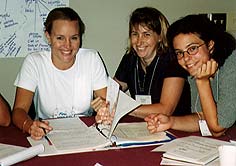|
Archived Content from Conference Held in October 2008
Search Results
Paper Session: A Tale of Four Immersion Children
Friday, October 17, 11:15 am, Room: State III
Linda Rau, Michigan State University
This study presents the immersion learner’s perception of the long-term results of participation in an immersion program to a field in which that voice has long been lacking. The ethnographic and autobiographical descriptions of the language acquisition of four children in a bicultural, bilingual family provide a unique contribution to the literature.
|
Paper Session: Aligning Maori/English Instructional Programmes for Academic Success
Friday, October 17, 11:15 am, Room: Windows on the River
Cath Rau, Kia Ata Mai Educational Trust
Toi te Reo (Preserve the Language) is an initiative which includes a professional development component for teachers in three total immersion in Maori elementary schools in New Zealand. The professional development addresses and further develops the relationship between the Maori and English language instructional programmes by aligning pedagogical practices for improved academic performance.
|
Paper Session: Authentic German Curricula for Non-native Speakers: Ramifications and Adaptations
Friday, October 17, 11:15 am, Room: Carousel East
Marcy Zachmeier-Ruh, Twin Cities German Immersion School
Research conducted by Twin Cities German Immersion School led to the decision to implement a German curriculum for the K-4 full immersion program. What adaptations have been necessary to make authentic curricula accessible to non-native speakers in the US? Key research-based components and highlights of grant-funded initiatives will be shared.
|
Paper Session: Brazilian Bilingual Education: Models, Programmes and Pedagogical Practices
Friday, October 17, 11:15 am, Room: Kellogg II
Lyle French, Escola Cidade Jardim
Brazil, and specifically the city of São Paulo, is experiencing a boom in the number of parents seeking bilingual education for their children. Most bilingual private schools begin English immersion around the age of 1½. In this session we will look at the practices and policies (or lack thereof) that govern the teaching of English immersion from preschool to middle school in the Brazilian private education sector. We will we also examine Brazilian Ministry of Education policy as well as standards.
|
Paper Session: Evaluation of a Dual Language Immersion Program in Rural Oregon
Friday, October 17, 11:15 am, Room: Kellogg I
Sally Hood, University of Portland
Angie Navarroa, Cecile Trost Elementary School
Danielle Reynolds, Cecile Trost Elementary School
This session focuses on a study designed to evaluate the effectiveness of a dual language immersion program (Spanish/English) at a rural elementary school in Oregon. Math and thematic based literacy instruction is taught in an 80/20 model. Presenters share elements leading to student academic achievement, instructional practices, and the evaluation process.
Session Handouts (in PDF): Powerpoint
|
Discussion Session: Key Design Issues at the Middle and High School Levels
Friday, October 17, 11:15 am, Room: Kellogg III
Martha Johnson, Highland Park Junior High
Moving beyond the elementary immersion program can be a challenge. Some key issues include which courses will be taught; curriculum development; funding; student participation and motivation; attrition and late entries; staffing (licensing and training); admission and transportation policies; student scheduling; teaming; L2 status; reducing fossilized errors; articulation; development of language production skills; and parent involvement.
|
Paper Session: Language Proficiency, Achievement and Attitudes in Two-Way Chinese Immersion Students
Friday, October 17, 11:15 am, Room: Great River Ballroom I
Kathryn Lindholm-Leary, San Jose State University
This presentation will focus on the outcomes of over 300 native English and native Chinese speaking fourth through tenth grade students in two Chinese immersion programs. Results include: district developed Chinese language proficiency tests in listening/speaking and reading/writing, achievement tests in English, and student attitudes toward bilingualism, biculturalism, and the immersion program.
Session Handouts (in PDF): PowerPoint
|
Paper Session: Promoting the Use of the Non-English Language in Immersion Classrooms
Friday, October 17, 11:15 am, Room: Great River Ballroom IV
Cheryl Urow, Illinois Resource Center
English often becomes the language of choice for students in two-way immersion classrooms and in one-way foreign language classrooms, thus defeating the aim of bilingualism and biliteracy. This session will introduce participants to strategies and activities that encourage students to use the non-English language in academic and social interactions.
|
Paper Session: Reference Framework for the Oral Communication Competencies of French Immersion Learners
Friday, October 17, 11:15 am, Room: Governors II
Thierry Karsenti, University of Montreal
Simon Collin, University of Montreal
The goal of this session is to present the Reference Framework for the Oral Communication Competencies of Second-Language Learners and its uses highlighted by 60 teachers. The evaluation rubric designed to help teachers use the Reference Framework will be introduced with some of the 50 video clips highlighting, within real classroom activities, a particular level of oral competency, portrayed by French immersion students from across Canada.
Session Handouts (in PDF): Reference Framework Reference Framework (French) PowerPoint
|
Paper Session: The Balancing Act: The What, When and How of Balanced Literacy
Friday, October 17, 11:15 am, Room: Governors III
Maureen Curran-Dorsano, Normandale Elementary French Immersion School
Mary Livant, Normandale Elementary French Immersion School
Reading, writing, spelling, vocabulary, grammar, oral proficiency...how to fit it all in? In this workshop you will see how one team of third grade teachers has managed to put these pieces of the literacy puzzle together. We will share our language arts model that maximizes student-teacher interaction and language development.
Session Handouts (in PDF): Handout PowerPoint
|
Paper Session: The Language Learning Motivation of Early Adolescent Immersion Graduates
Friday, October 17, 11:15 am, Room: State I
Pamela Wesely, University of Minnesota
What happens to students who graduate from elementary immersion programs and enter middle school? Are they motivated to learn languages? How does that link to their continuation in immersion education, and other factors? This research study explores these questions via surveys and interviews with graduates from five elementary immersion schools.
Session Handouts (in PDF): Handout
|

|




